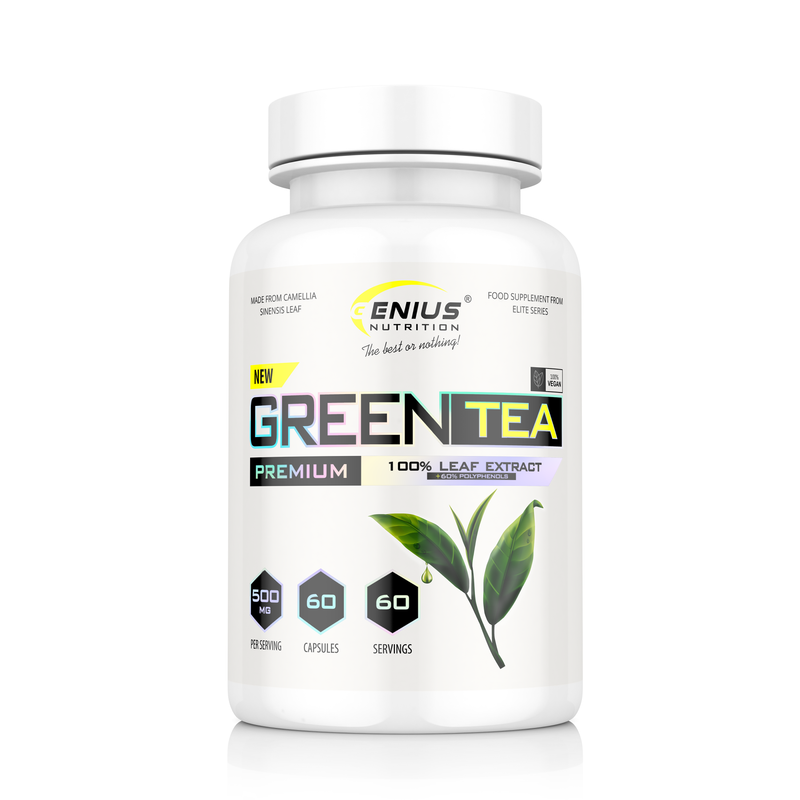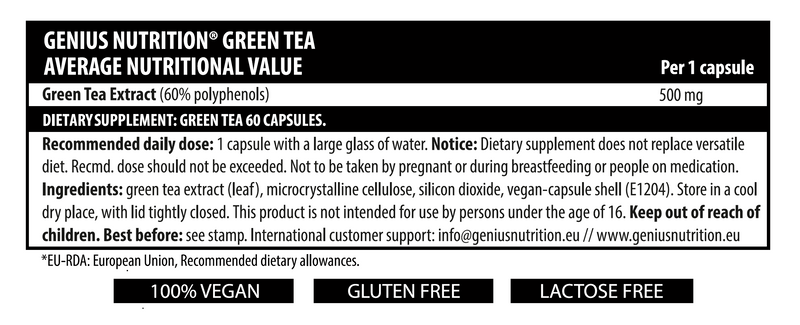MAKES EVERYTHING BETTER
The Japanese custom of drinking tea is not the original one. It came from ancient China around 800 AD! In fact, even then, there was a belief that tea was a medical, healthy drink.
Green tea is definitely worthy of your attention.
MUCH MORE THAN JUST A TEA
So, let's start.
How healthy is green tea?
Green tea has been considered a medicinal plant for more than 5,000 years thanks to many valuable ingredients such as vitamins A, B1, B2, B3, C, E, and K. In combination with potassium, calcium, zinc, iron, fluorine, and phytochemical components.
Green tea is one of those herbs that does do a lot for you health-wise.
What exactly does green tea do for the body?
The herbal substances in green tea protect cells from the harmful effects of free radicals. Some studies even indicate anti-aging effects. Its caffeine has a strengthening impact, while tannins calm the stomach and intestines.
Genius Nutrition® made it obligatory to carefully refine the green tea leaves to save every valuable compound for you.
Green tea is obtained from the family called Camellia sinensis. We brought it by first steaming the leaves of the tea plant, then twisting and drying them. The steaming process kills enzymes that would otherwise break down leaves.
It is this process that gives green tea a unique taste.
Genius Nutrition® Green Tea Extract offers a convenient way to preserve green tea's active ingredients in a concentrated capsule form.
And mighty polyphenols are preserved along with freshness.
The polyphenol EGCG (epigallocatechin gallate) is considered to be an essential active component.
Polyphenols are THE MOST critical compounds in green tea that have antioxidant potential, i.e., protect cells from damage, disease, and at the same time, slow down the aging process.
The knowledge that green tea prevents lipid peroxidation (a process involved in developing various pathological conditions) is fundamental when it comes to slowing down atherosclerosis.
Also, green tea gives the arteries an infusion against platelet clotting and sticking. It also controls the build-up of LDL cholesterol on the arterial walls.
Therefore preventing heart diseases.
All the benefits of green tea without all the hassle of brewing it. What more can you ask for?
Green tea may be beneficial in your weight loss process because it helps curb hunger. You can have it early in the morning when it will give you an energy boost.
It especially does the trick if you're a pre-diabetic because you can practice intermittent fasting. It does a great job of targeting belly fat, and love handles when you work out.
People expecting a miraculous fat burner should look elsewhere. Green tea can help you lose visceral fat if you are already eating well and exercising, but it can't do all the work for you.
Believe it or not, green tea is quite present in the world of mixed martial arts, i.e., MMA, because it affects growth hormone positively.
A recent study conducted by scientists from the American Center for Alternative Medicine confirmed that EGCG directly affects growth hormone levels. Study participants who drank green tea for 90 days, i.e., had an elevated level of growth hormone by 320%.
Not bad for such a girly ceremony.
Now you know why green tea was so popular in the land of karate. And now you can have it on your kitchen table.
No worries, small capsules, easy to swallow, and a good-sized dose will save you from drinking 3-5 cups of green tea per day.
What is inside?
100% Green tea leaf extract (Camellia Sinesis) + 60% polyphenols
Recommended daily dose: 1 capsule with a large glass of water.
Warning! Dietary supplements are only intended for healthy persons. Do not take if pregnant or breastfeeding. Keep out of the reach of children. This dietary supplement should not be used as a substitute for a varied and balanced diet. Do not exceed recommended daily dose. Consume preferably before the date indicated on the container. Store in a cool and dry place.
REFERENCES:
1. https://www.ncbi.nlm.nih.gov/pmc/articles/PMC4679480/
2. https://pubmed.ncbi.nlm.nih.gov/28864169/
3. https://journals.physiology.org/doi/full/10.1152/ajpregu.00832.2005?url_ver=Z39.88-2003&rfr_id=ori%3Arid%3Acrossref.org&rfr_dat=cr_pub%3Dpubmed&
MAKES EVERYTHING BETTER
The Japanese custom of drinking tea is not the original one. It came from ancient China around 800 AD! In fact, even then, there was a belief that tea was a medical, healthy drink.
Green tea is definitely worthy of your attention.
MUCH MORE THAN JUST A TEA
So, let's start.
How healthy is green tea?
Green tea has been considered a medicinal plant for more than 5,000 years thanks to many valuable ingredients such as vitamins A, B1, B2, B3, C, E, and K. In combination with potassium, calcium, zinc, iron, fluorine, and phytochemical components.
Green tea is one of those herbs that does do a lot for you health-wise.
What exactly does green tea do for the body?
The herbal substances in green tea protect cells from the harmful effects of free radicals. Some studies even indicate anti-aging effects. Its caffeine has a strengthening impact, while tannins calm the stomach and intestines.
Genius Nutrition® made it obligatory to carefully refine the green tea leaves to save every valuable compound for you.
Green tea is obtained from the family called Camellia sinensis. We brought it by first steaming the leaves of the tea plant, then twisting and drying them. The steaming process kills enzymes that would otherwise break down leaves.
It is this process that gives green tea a unique taste.
Genius Nutrition® Green Tea Extract offers a convenient way to preserve green tea's active ingredients in a concentrated capsule form.
And mighty polyphenols are preserved along with freshness.
The polyphenol EGCG (epigallocatechin gallate) is considered to be an essential active component.
Polyphenols are THE MOST critical compounds in green tea that have antioxidant potential, i.e., protect cells from damage, disease, and at the same time, slow down the aging process.
The knowledge that green tea prevents lipid peroxidation (a process involved in developing various pathological conditions) is fundamental when it comes to slowing down atherosclerosis.
Also, green tea gives the arteries an infusion against platelet clotting and sticking. It also controls the build-up of LDL cholesterol on the arterial walls.
Therefore preventing heart diseases.
All the benefits of green tea without all the hassle of brewing it. What more can you ask for?
Green tea may be beneficial in your weight loss process because it helps curb hunger. You can have it early in the morning when it will give you an energy boost.
It especially does the trick if you're a pre-diabetic because you can practice intermittent fasting. It does a great job of targeting belly fat, and love handles when you work out.
People expecting a miraculous fat burner should look elsewhere. Green tea can help you lose visceral fat if you are already eating well and exercising, but it can't do all the work for you.
Believe it or not, green tea is quite present in the world of mixed martial arts, i.e., MMA, because it affects growth hormone positively.
A recent study conducted by scientists from the American Center for Alternative Medicine confirmed that EGCG directly affects growth hormone levels. Study participants who drank green tea for 90 days, i.e., had an elevated level of growth hormone by 320%.
Not bad for such a girly ceremony.
Now you know why green tea was so popular in the land of karate. And now you can have it on your kitchen table.
No worries, small capsules, easy to swallow, and a good-sized dose will save you from drinking 3-5 cups of green tea per day.
What is inside?
100% Green tea leaf extract (Camellia Sinesis) + 60% polyphenols
Recommended daily dose: 1 capsule with a large glass of water.
Warning! Dietary supplements are only intended for healthy persons. Do not take if pregnant or breastfeeding. Keep out of the reach of children. This dietary supplement should not be used as a substitute for a varied and balanced diet. Do not exceed recommended daily dose. Consume preferably before the date indicated on the container. Store in a cool and dry place.
REFERENCES:
1. https://www.ncbi.nlm.nih.gov/pmc/articles/PMC4679480/
2. https://pubmed.ncbi.nlm.nih.gov/28864169/
3. https://journals.physiology.org/doi/full/10.1152/ajpregu.00832.2005?url_ver=Z39.88-2003&rfr_id=ori%3Arid%3Acrossref.org&rfr_dat=cr_pub%3Dpubmed&




